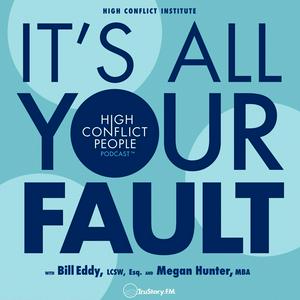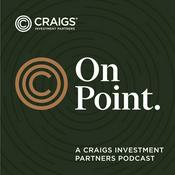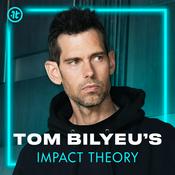197 episodes
- The Evolution of Family Estrangement: Understanding Adult Children Cutting Ties
Bill Eddy and Megan Hunter explore the growing phenomenon of adult children severing relationships with parents, examining research, societal shifts, and potential solutions. Drawing from their experience at the High Conflict Institute, they analyze Oprah's recent YouTube conversation with Dr. Joshua Coleman about family estrangement, offering professional insights into this complex dynamic affecting millions of families.
Understanding Modern Family Estrangement
Research indicates approximately one-third of Americans experience parent-child estrangement. The hosts examine how smaller family sizes, increased mobility, and social media influence these dynamics, while exploring the impact of shifting cultural values, mental health awareness, and changing approaches to conflict resolution.
Questions Addressed in This Episode:
What factors contribute to increased family estrangement?
How do cultural differences affect family relationship patterns?
When might relationship boundaries be appropriate versus complete estrangement?
What impact does estrangement have on extended family relationships?
How can families develop better conflict resolution skills?
Key Takeaways:
Family estrangement often reflects broader societal shifts in relationship dynamics
Conflict resolution skills are crucial for maintaining family connections
Modern technology and social media can both help and hinder family relationships
Setting appropriate boundaries differs from complete relationship termination
Most estrangements are temporary, with opportunities for reconciliation
The episode provides valuable insights for anyone navigating complex family relationships, offering understanding of this significant societal trend and practical approaches for addressing relationship challenges.
Additional Resources
Oprah Video- Why Adult Children are Cutting Ties With Their Parents
Expert Publications
SLIC Solutions for Conflict: Setting Limits & Imposing Consequences in 2 1/2 Steps
Our New World of Adult Bullies
Contact Us For High-Conflict Training
Understanding & Managing High-Conflict Training
Professional & Personal Development
HCI’s courses:Conflict Influencer® - for famlies (new classes starting January 2026)
High-Conflict Law Certification - for legal professionals (starts March 2026)
Connect With Us
Visit High Conflict Institute: highconflictinstitute.com
Submit questions for Bill and Megan
Browse our complete collection of books and resources in our online store—available in print and e-book formats
Find these show notes and all past episode notes on our website
Watch this episode on YouTube!
Important Notice
Our discussions focus on behavioral patterns rather than diagnoses. For specific legal or therapeutic guidance, please consult qualified professionals in your area.
(00:00) - Welcome to It's All Your Fault
(00:41) - Why Adult Children Cut Ties with Parents
(04:13) - Why More Rifts
(11:11) - US Experience
(13:45) - Mexico and Religion
(16:20) - Destabilizing for Kids
(21:25) - Intergenerational
(22:56) - Everyone Needs These Skills
(25:30) - Setting Consequences
(26:58) - How Can You Make It Better?
(29:02) - Wrap Up SLIC Solutions for Limits: How to Set Boundaries That Actually Work (with Ekaterina Ricci)
29/1/2026 | 48 mins.Setting Effective Limits: A Conversation About SLIC Solutions for Conflict
Bill Eddy and Megan Hunter welcome co-author Ekaterina Ricci to discuss their new book "SLIC Solutions for Conflict," exploring practical approaches to setting limits and consequences with individuals who demonstrate challenging behaviors.
The episode introduces the "two and a half steps" approach: establishing clear boundaries, implementing consequences, and selectively using empathy, attention, and respect (EAR) statements. Traditional empathy-focused approaches may sometimes enable rather than resolve difficult situations, particularly with individuals who demonstrate manipulative behaviors.
Bill Eddy outlines five crucial questions for establishing consequences: Is it proportional? Have positive consequences been considered? Is it safe? Are you prepared to enforce it? Do you need assistance?
Questions we answer: How can empathy make conflict worse? Why is advance preparation important? How does social media impact younger generations' ability to set boundaries? When should you seek help imposing consequences?
Whether managing professional relationships, navigating family dynamics, or maintaining personal boundaries, this episode provides practical tools for setting effective limits while maintaining respect and safety. Learn how preparation, practice, and proper timing can help you implement boundaries with confidence.
Additional Resources
Watch this episode on YouTube!
Expert Publications
SLIC Solutions for Conflict: Setting Limits & Imposing Consequences in 2 1/2 Steps
High-Conflict Training
Understanding & Managing High-Conflict Training
Personal Development
Conflict Influencer Group Class - starts January 21
New Ways for Couples: Online Class + Coaching
Professional Development
Family Law Consultation Group with Bill Eddy - starts March 2026
Connect With Us
Visit High Conflict Institute: highconflictinstitute.com
Submit questions for Bill and Megan
Browse our complete collection of books and resources in our online store—available in print and e-book formats
Find these show notes and all past episode notes on our website
Important Notice
Our discussions focus on behavioral patterns rather than diagnoses. For specific legal or therapeutic guidance, please consult qualified professionals in your area.
(00:00) - Welcome to It's All Your Fault
(00:49) - SLIC Solutions for Conflict
(01:22) - About Ekaterina
(03:23) - Why This Book?
(04:07) - When Empathy Makes It Worse
(06:31) - Two-and-a-Half Steps
(08:29) - Consequence
(11:13) - Role Play Practice
(13:31) - Learning How to Set the Limit
(16:56) - Younger Generations and Setting LImits
(20:03) - Social Media Example
(22:08) - Surprises in the Writing of It
(25:36) - Something Hopeful
(29:54) - Creating Space for Yourself
(32:38) - The Five Questions
(37:55) - The Writing Experience
(38:52) - A Few Examples
(43:28) - Doing What's Right
(46:35) - Wrapping UpSelf-Compassion and DBT: How New Treatment Approaches Transform BPD Recovery with Amanda Smith
22/1/2026 | 45 mins.In this episode of It's All Your Fault, host Megan Hunter interviews Amanda Smith, LCSW, about her groundbreaking new book on self-compassion and Dialectical Behavior Therapy (DBT) skills for people who have borderline personality disorder traits. The discussion explores how incorporating self-compassion into treatment can enhance recovery and improve outcomes.
Understanding Self-Compassion in BPD Treatment
The conversation delves into how self-compassion serves as a vital but often overlooked component in treating borderline personality disorder traits. Amanda Smith draws on 19 years of clinical experience to explain why traditional confrontational approaches often backfire, while self-compassion can help reduce self-destructive behaviors and improve emotional regulation.
Research shows that increased self-compassion correlates with better mental health outcomes, healthier relationships, and reduced anxiety and depression. This episode examines how these findings specifically apply to people working to manage borderline personality disorder traits.
Questions We Answer in This Episode
How has treatment for borderline personality disorder evolved over the past 20 years?
What role does self-compassion play in DBT skills training?
How can family members support loved ones who cannot access immediate treatment?
When should boundaries and limits be introduced in treatment?
How does self-compassion affect recovery outcomes?
Key Takeaways
Self-compassion can serve as a replacement skill for self-destructive behaviors
DBT skills can be learned and practiced by family members to support loved ones
Treatment approaches work best when starting with validation before introducing structure
Recovery is possible with appropriate evidence-based treatment
Early intervention, even before age 18, can be beneficial when approached appropriately
The episode provides hope and practical guidance for anyone impacted by borderline personality disorder traits, while highlighting the importance of combining clinical skill development with self-compassion practices. Listeners will gain insights into both professional and personal approaches to supporting recovery.
Additional Resources
Watch this episode on YouTube!
Expert Publications by Amanda L. Smith
The Self-Compassion Workbook for BPD
The Dialectical Behavior Therapy Wellness Planner: 365 Days of Healthy Living for Your Body, Mind, and Spirit
The Borderline Personality Disorder Wellness Planner for Families: 52 Weeks of Hope, Inspiration, and Mindful Ideas for Greater Peace and Happiness
Expert Publications
SLIC Solutions for Conflict: Setting Limits & Imposing Consequences in 2 1/2 Steps
Professional & Personal Development
Amanda Smith’s Family DBT course
HCI’s courses:Conflict Influencer® - for co-parents (new classes starting January 2026)
Conflict Influencer® - for famlies (new classes starting January 2026)
High-Conflict Law Certification - for legal professionals
Connect With Us
Visit High Conflict Institute: highconflictinstitute.com
Submit questions for Bill and Megan
Browse our complete collection of books and resources in our online store—available in print and e-book formats
Find these show notes and all past episode notes on our website
Important Notice
Our discussions focus on behavioral patterns rather than diagnoses. For specific legal or therapeutic guidance, please consult qualified professionals in your area.
(00:00) - Welcome to It's All Your Fault
(00:46) - Meet Amanda Smith
(03:34) - Creating a Life Worth Living
(06:03) - Progression Over Time
(09:45) - Other Terms
(11:54) - Lack of Awareness
(13:30) - Addressing with DBT
(14:50) - Exceptions and Causes
(16:11) - Giving Hope
(17:55) - Age Groups
(19:51) - When They Can’t Get Into Treatment
(24:37) - Boundaries and Limits
(28:32) - Amanda’s New Book
(31:57) - Compassion for Self
(37:11) - Trying the Opposite
(41:59) - The Book
(43:32) - Wrap Up- In this classic episode from the archives, Bill and Megan examine the growing challenges faced by elderly populations dealing with individuals who demonstrate high conflict behaviors. As global demographics shift toward an aging population, understanding how to protect vulnerable seniors becomes increasingly critical.
The hosts explore how individuals who exhibit manipulative personality traits may target elderly people through isolation, financial exploitation, and emotional manipulation. They discuss why traditional support systems may miss these subtle forms of control, and how societal changes have created new vulnerabilities.
Key Vulnerabilities Addressed:
Increasing isolation in elderly populations
Financial exploitation risks
Manipulation by caregivers and family members
Essential Protection Strategies:
Maintaining regular, unannounced visits
Asking specific, direct questions
Creating support networks and oversight
Drawing from extensive research and case examples, Bill and Megan provide practical guidance for recognizing warning signs and taking appropriate action. They emphasize the importance of balancing respect for autonomy with necessary protective measures.
This episode offers valuable insights for anyone concerned about elderly loved ones or planning for their own future security. The discussion highlights how proper awareness and early intervention can help protect our most vulnerable community members.
Additional Resources
Books & Expert Publications:
Our New World of Adult Bullies
5 Types of People Who Can Ruin Your Life
SLIC Solutions for Conflict: Setting Limits & Imposing Consequences in 2 1/2 Steps
Articles & Resources:
Protecting the Elderly in Our New World of Adult Bullies
Training & Professional Development:
Custom Training for Organizations
New Ways Training Programs
Conflict Influencer Class
Connect With Us:
Visit High Conflict Institute
Submit questions for Bill and Megan
Browse our complete collection in our online store
Important Notice: Our discussions focus on behavioral patterns rather than diagnoses. For specific legal or therapeutic guidance, please consult qualified professionals in your area.
(00:00) - Welcome to It's All Your Fault
(00:43) - Podcast Update
(12:39) - The Elderly and High Conflict
(24:34) - When They Deny It
(27:22) - CARS Method
(31:55) - Being Targeted
(34:08) - Keep an Eye Out for Them
(36:45) - Wrap Up
(37:30) - See You Next Year! Worth Repeating: Setting Limits Without Public Exposure to Manage Difficult Behavior
08/1/2026 | 25 mins.Exposure and Public Shaming as Conflict Management Tools: A Critical Analysis
In this back episode from the High Conflict Institute podcast, Bill Eddy and Megan Hunter tackle a challenging question that many face when dealing with difficult workplace situations: Is exposing someone's problematic behavior an effective strategy for creating change? While the impulse to "name and shame" may feel justified, especially when facing reputation damage or distortion campaigns, the hosts explore why this approach often backfires with high conflict personalities.
When dealing with individuals who demonstrate high conflict behavior patterns, the threat of exposure frequently escalates rather than resolves situations. The hosts examine how cluster B personality traits like being domineering, vindictive and intrusive can make public confrontation particularly counterproductive.
Key Questions Addressed:
Does exposing problematic behavior lead to meaningful change?
When might the threat of exposure be strategically useful?
How should organizations balance accountability with escalation risks?
Core Strategic Insights:
Private criticism tends to be more effective than public shaming
Skills-based coaching offers better outcomes than humiliation
Natural consequences work better than intentional exposure
Through examining both legal precedents and business case studies, the hosts demonstrate why investing in skill development and structured interventions often proves more valuable than reactive exposure strategies. The episode provides concrete examples of more effective approaches, from healthcare settings to corporate environments.
Drawing on Harvard research and real-world examples like the Harvey Weinstein case, Bill and Megan illustrate the complex factors organizations must weigh when deciding how to address problematic behavior. They emphasize that while public exposure may occasionally be necessary, it should typically be a last resort after other interventions have been attempted.
Additional Resources
Books:
It's All Your Fault at Work: Managing Narcissists and Other High-Conflict People
5 Types of People Who Can Ruin Your Life
BIFF at Work: Your Guide to Difficult Workplace Communication
SLIC Solutions for Conflict: Setting Limits & Imposing Consequences in 2 1/2 Steps
Articles:
Fire or Keep High-Conflict Employees?
Should Employees with High-Conflict Behaviors Be Given a Chance to Change?
Professional Development:
New Ways Training Programs (workplace, mediation, divorce)
Conflict Influencer Class (for personal situations)
Custom Training for Organizations
High Conflict Institute Consultation Services
Connect With Us:
Visit High Conflict Institute
Submit questions for Bill and Megan
Browse our complete collection in our online store
Find all episode notes on our website
Important Notice: Our discussions focus on behavioral patterns rather than diagnoses. For specific legal or therapeutic guidance, please consult qualified professionals in your area.
(00:00) - Welcome to It's All Your Fault
(01:31) - Exposure and Humiliation as a High-Conflict Strategy
(02:21) - Good or Bad Idea?
(08:14) - Exposure Doesn't Necessarily Stop Them
(11:08) - Good Strategies
(14:53) - Get Toxic People Out of Your Life
(18:10) - Conversions Through Coaching
(19:57) - Thinking It Through
(21:29) - Intervention
(24:00) - Coming Next Week: Harry, Megan, and the Coronation
More Business podcasts
Trending Business podcasts
About It’s All Your Fault: High Conflict People
Hosted by Bill Eddy, LCSW, Esq. and Megan Hunter, MBA, It’s All Your Fault! High Conflict People explores the five types of people who can ruin your life—people with high conflict personalities and how they weave themselves into our lives in romance, at work, next door, at school, places of worship, and just about everywhere, causing chaos, exhaustion, and dread for everyone else.
They are the most difficult of difficult people — some would say they’re toxic. Without them, tv shows, movies, and the news would be boring, but who wants to live that way in your own life!
Have you ever wanted to know what drives them to act this way?
In the It’s All Your Fault podcast, we’ll take you behind the scenes to understand what’s happening in the brain and illuminates why we pick HCPs as life partners, why we hire them, and how we can handle interactions and relationships with them. We break down everything you ever wanted to know about people with the 5 high conflict personality types: narcissistic, borderline, histrionic, antisocial/sociopath, and paranoid.
And we’ll give you tips on how to spot them and how to deal with them.
Podcast websiteListen to It’s All Your Fault: High Conflict People, The Prof G Pod with Scott Galloway and many other podcasts from around the world with the radio.net app

Get the free radio.net app
- Stations and podcasts to bookmark
- Stream via Wi-Fi or Bluetooth
- Supports Carplay & Android Auto
- Many other app features
Get the free radio.net app
- Stations and podcasts to bookmark
- Stream via Wi-Fi or Bluetooth
- Supports Carplay & Android Auto
- Many other app features


It’s All Your Fault: High Conflict People
Scan code,
download the app,
start listening.
download the app,
start listening.








































